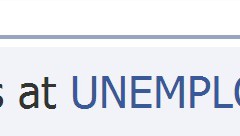Adult Life Put on Hold

I remember the day I passed my final exam at university. It was one of the happiest days of my life as it meant that I was no longer a student and had completed a significant phase of my life. Completing higher education signifies the entry into adult life. You are no longer a student; you should start taking care of yourself and stop depending on your parents’ hand-outs. I continued to have feel exhilarated even though I didn’t have a job lined up. I hadn’t yet applied for any position nor could I have expected that there would be much demand for a recent graduate in political science. About a month after this happy day, I was called to fill a temporary position and soon afterwards was offered a full time job.
Such an experience is rare in Macedonia. For most young people it takes years and years to find a job. Unemployment, currently standing at 31.2%, has put a heavy burden on the life of the country over the last two decades. This incredibly high rate is not due to some new crises; it’s more of a structural problem. In the past it was even higher (36%). And young people are the group most hard hit. According to official statistics, an overwhelming 51.2% of young people in the 15-29 age group are unemployed. To a large extent, this is because of economic inactivity (NEET: not in education, employment, or training) among young adults. Young Albanians and rural youth are disproportionally more present in the NEET group. The scarcity of jobs on the labor market and the lack of true demand for workers, discourages young people from looking for work. But it’s hardly their fault: in the years of transition, the weak Macedonian economy was severely damaged by privatization, which was done unfairly and produced oligarchs not general prosperity as countless blue and white collar workers lost their jobs. Since then, the economy has stabilized, there are no longer massive lay-offs, but government policies have been slow to create only minimal economic growth and even slower at job creation.
The way things stand, most people do not rely on the job center when looking for work. Family connections and friends are the first ones you check out. It’s really useful if your mother or father knows some businessman or manager in the public sector who can return an old favor by taking you on board. If you don’t have these options, a political party is a much more reliable “employment agency”. When in power, it’s a most reliable job provider. The “Company” of the party state and public administration offers plenty of jobs with very lax entry criteria. Most young people see this as the best option. Public administration might not offer a great salary, but it’s a regular one with all benefits paid, and it’s highly unlikely that you’ll ever be sacked.
Young people should be bolder and instead of waiting to be hired, look around for ways to create jobs themselves. In the absence of an entrepreneurial tradition, the government has introduced business and entrepreneurship courses and projects in primary and secondary education. Other measures have also been implemented to stimulate the creation of small businesses. Additional support measures will also be necessary, as running expenses still outweigh any profit.
Another way out of unemployment seems to be just growing older: once a young person turns 30, she or he faces an unemployment rate of a mere 30.1 percent – 20 percent below that for 15-29 age group, though no doubt a young person from the USA, India or Brazil would still think this figure was excessively high.
Tags: economic growth, jobs, youth, youth unemployment

